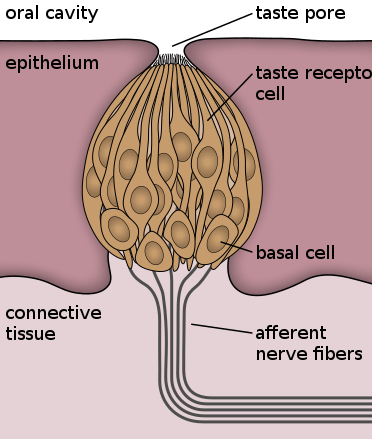I like spicy food. I’m not going to enter any chilli eating competitions any time soon, but I think most foods benefit from an extra kick of heat. The problem is, when you’re the sort of person who sometimes carries a bottle of Tabasco in your bag “just in case”, people make a lot of comments about spice to you. A lot of them, even from skeptics, are based outside of any real evidence.
“You’re killing your taste buds”
This is the most common one I hear. If I ever comment on a food (not one prepared by the person I’m talking to, that would be rude) being bland or lacking flavour people will often retort that “well you’ve just killed your taste buds by eating so much chilli”. On a personal, anecdotal level, I know this to be untrue – in fact, since I started eating spicy food my palette has expanded so much and I can identify a far wider range of flavours than I could before… though this is probably nothing to do with the chilli either.

But what about the science of it? The surface of the tongue is covered in taste buds and these taste buds contain, among other things, gustatory cells. On the surface of gustatory cells are taste receptors. We can cause physical damage to the surface of our tongue, and even extremely spicy chilli peppers might cause damage, but this damage is repaired quickly – the average turnover of gustatory cells is 8-12 days. More commonly spice just makes your tongue a bit numb.
But really people aren’t talking about physical damage – they’re talking about desensitisation. While it’s not true that different parts of the tongue identify different tastes, it is true that we have different types of taste receptor for different flavours. The receptor responsible for detecting the heat molecule in hot chilli peppers, capsaicin, is actually a pain receptor called TRPV1. It is independent from our other taste receptors. It is likely true that this pain receptor can become desensitised to the pain caused by capsaicin, which is why people can build up a tolerance to spicy foods, but since this receptor is independent from our other flavour receptors there is no reason, or evidence, to think the spice will dampen our detection of other flavours.
Spicy foods induce labour
This is probably the second most common myth I hear, usually on TV shows rather than from anyone in my personal life. There’s no evidence that eating spicy foods can cause the onset of labour in late pregnancy. But a lot of women do give it a go; theories as to why people believe this myth include that capsaicin can induce contractions in the uterine wall and the GI tract which can be mistaken for the onset of labour.
Spicy foods make IBS worse
This isn’t a total myth, but it’s often treated as 100% true in all IBS cases and that is a myth. IBS varies from person to person and we don’t really know much about what causes it. We do know that capsaicin can accelerate food transit time through the gut, so eating a lot of spicy food can cause bloating and diarrhoea. We also know that the body can become tolerant of spicy food if we habitually eat it. For people who routinely eat spicy food and don’t notice any gastric distress when they do so, there’s no reason to cut spicy food from their diet to help manage IBS symptoms.
Many people with IBS are sensitive to foods high in fermentable oligosaccharides, disaccharides, monosaccharides and polyols (FODMAPs), some of the foods highest in FODMAPs include onion and garlic – something you often find in cuisines that use a lot of chilli pepper. So even in people who do see their IBS symptoms flare when they eat spicy foods – it might not be the chilli.
Spicy food causes ulcers
This is an easy one. Chillies don’t cause ulcers, H. pylori does. Or prolonged exposure to non-steroidal anti-inflammatories. Chillies might make stomach ulcers that already exist feel a little worse.
Spicy foods are addictive
Of course, this is a myth – you cannot come physically dependent on spicy foods. However, because capsaicin is a pain stimulus, you can get a positive reaction from ingesting it. This is because when the body encounters pain it tends to produce chemicals in order to reduce the effect of that pain. So it’s possible that you eat a spicy chilli and your body floods with endorphins and that makes you feel good and makes you want to eat more of the stuff.

Some studies have, however, suggested that there’s more to it than that – that it might related to your personality type. If you have the sort of personality that leads you to seek specific types of sensation, you might enjoy the sensation of eating chilli peppers. But as with many things related to the enjoyment of spicy food, more research is necessary to confirm these links.
Spice is interesting – it can feel differently depending on the type of nerves or receptors it activates. For example, wasabi has its very own pain receptor called TRPA1 which is why the sensation feels slightly different, and Szechuan pepper might stimulate mechanoreceptors on nerve fibres that cause the characteristic tingling sensation.
Beyond that, capsaicin has been studied as a potential pain-relieving compound that could be used to treat pain caused by conditions like arthritis. But it’s not magic, it can’t destroy your ability to taste, nor can it bring a baby into the world any quicker. If you enjoy it, it’s safe to eat. And if you don’t – try not to judge those of us who do!



